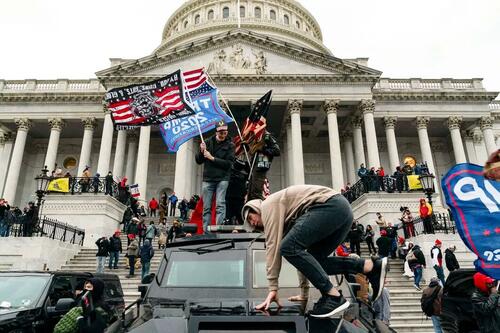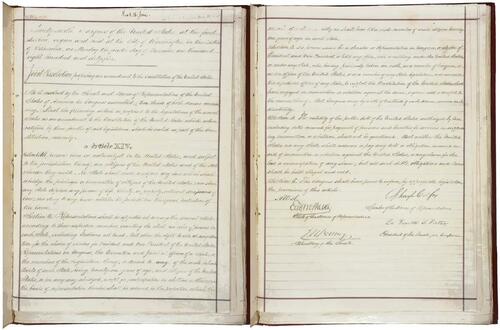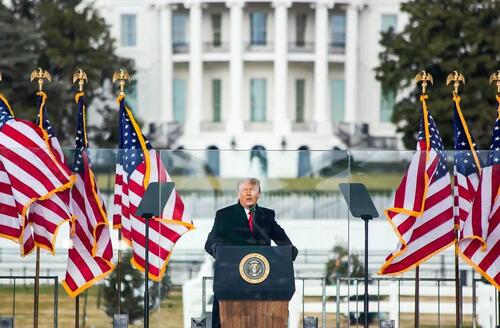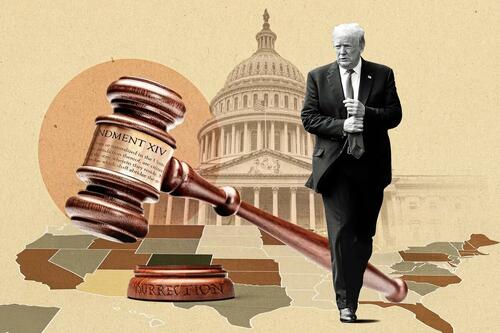Authored by Sam Dorman via The Epoch Times (emphasis ours),
A slew of lawsuits are looking for to disqualify President Donald Trump from operating for workplace in 2024, creating an more and more unstable presidential election season.
All of those makes an attempt relaxation on an argument that the “revolt” clause of the 14th Modification bars the previous president from showing on the poll.
Essentially the most vital determination was handed down on Dec. 21, when the Colorado Supreme Courtroom dominated in a 4–3 determination that President Trump couldn’t seem on the state’s poll as a result of he had engaged in an revolt on Jan. 6, 2021.
The Colorado ruling seems to be triggering and renewing efforts to kick the previous president off the poll in different blue-leaning states, together with New York, California, and Pennsylvania.
A decrease courtroom in Colorado had equally dominated that President Trump engaged in an revolt however stopped wanting disqualifying him after discovering that the 14th Modification does not apply to presidents.
Enacted after the Civil Conflict, the text of Part 3 of the 14th Modification reads: “No particular person shall be a Senator or Consultant in Congress, or elector of President and Vice-President, or maintain any workplace, civil or navy, beneath the US, or beneath any State, who, having beforehand taken an oath, as a member of Congress, or as an officer of the US, or as a member of any State legislature, or as an government or judicial officer of any State, to assist the Structure of the US, shall have engaged in revolt or revolt in opposition to the identical, or given support or consolation to the enemies thereof. However Congress might by a vote of two-thirds of every Home, take away such incapacity.”
This comparatively untested provision is now set to come back earlier than the nation’s highest courtroom.
“This case is definitely destined for the Supreme Courtroom to interpret the 14th Modification and resolve whether or not Trump is disqualified from the presidency,” mentioned College of Michigan regulation professor Barbara McQuade, who left the Trump administration amongst a wave of resignations at first of his time period.
Who that part applies to, what constitutes an revolt, and the way the part is enforced have been the topic of vigorous debate.
Embedded inside these questions are a collection of others that would make deciding or implementing poll disqualification circumstances particularly sophisticated.
Listed here are among the main questions that courts and politicians might contemplate.
1. What Is an Revolt?
Efforts to disqualify President Trump hinge partly on whether or not his actions surrounding the Jan. 6, 2021, riots qualify as partaking in the kind of revolt talked about in Part 3.
To reply that query, observers have drawn from historic data, federal regulation, and proof surrounding Jan. 6.

In accordance with Colorado District Choose Sarah Wallace’s reasoning, President Trump used language he knew would provoke violence on Jan. 6, 2021, however was obscure sufficient to keep up believable deniability. For her, that glad Part 3’s requirement that a person “engaged in revolt or revolt.”
Some, nevertheless, have questioned that line of reasoning on condition that not one of the Jan. 6 defendants, nor President Trump himself, have been charged with violating federal regulation relating to an revolt.
South Texas Faculty regulation professor Josh Blackman has mentioned that “federal prosecutions for revolt are extraordinarily uncommon” and informed Click2Houston that crimes similar to “revolt, treason, or sedition are very, very exhausting to show.”
“They require mainly an intent to attempt to frustrate or subvert the federal government,” he mentioned.
There are further questions as as to whether the 14th Modification defines revolt the identical approach federal regulation does, or whether or not federal regulation and the 14th Modification require the identical stage of proof to ascertain that people are responsible of revolt.
Underneath the 14th Modification, assembly the brink of “revolt” is “a very excessive bar,” mentioned Roger Severino, vp of home coverage at The Heritage Basis. He additionally served within the Well being and Human Providers Division beneath President Trump.
“I did not see something enough to justify such an incendiary cost,” Mr. Severino informed The Epoch Occasions.
He mentioned the reference to revolt within the 14th Modification took place after invasions of the north throughout the Civil Conflict.
Throughout the Civil Conflict, “you had armed invasions of the north … that is what revolt was referring to within the 14th Modification,” he mentioned.

Horace Cooper, senior fellow with the Nationwide Heart for Public Coverage Analysis, who previously taught constitutional regulation at George Mason College, mentioned that “their goal was particularly the Confederacy.”
“Their goal was not anybody who supported the French within the French–Indian Conflict. Their goal was not anybody who supported the British within the British–American Conflict. Although the language isn’t written in a solution to restrict these, the rationale was the Confederacy,” he mentioned.
Nonetheless, some students say that President Trump has glad the 14th Modification’s necessities for partaking in an revolt.
“Part Three covers a broad vary of conduct in opposition to the authority of the constitutional order, together with many situations of oblique participation or assist as ‘support or consolation,’” mentioned College of Chicago regulation professor William Baude and College of St. Thomas regulation professor Michael Stokes Paulsen in a paper.
“It covers a broad vary of former places of work, together with the presidency. And particularly, it disqualifies former President Donald Trump, and doubtlessly many others, due to their participation within the tried overthrow of the 2020 presidential election.”
2. Is Trump an ‘Officer of the US’?
Choose Wallace’s opinion avoided disqualifying President Trump as a result of, she mentioned, even when he dedicated an revolt, she didn’t have sufficient proof to definitively say he was the kind of “officer” that the 14th Modification prohibits from partaking in an revolt.
Hans von Spakovsky, a former member of the Federal Election Fee, has argued that two prior Supreme Courtroom selections comprise language indicating that “officers” of the US do not embody presidents.
Extra particularly, each Free Enterprise Fund v. Public Firm Accounting Oversight Board and United States v. Mouat outline officers as appointees of the president and others.
Washington College regulation professor Andrea Katz disagrees.
“You will discover circumstances which have held definitely on the contrary,” she informed The Epoch Occasions, pointing to Lucia v. Securities and Alternate Fee.

Quoting a previous courtroom determination, Supreme Courtroom Justice Elena Kagan mentioned in 2018 that an officer “should occupy a ‘persevering with’ place established by regulation, and should ‘exercis[e] vital authority pursuant to the legal guidelines of the US.’”
Ms. Katz mentioned that “it looks like each widespread understanding—the textual content of the Supreme Courtroom, and the legislators’ understanding in drafting the 14th modification—was that the president was going to be coated by this language.”
In its determination, the Colorado Supreme Courtroom argued that the modification’s drafters “understood the president as an officer of the US” and that the Structure as an entire supported that conclusion.
3. Can Courts Implement Part 3?
Even when it was clear that Part 3 included President Trump’s conduct, questions stay as as to whether courts can take away him from the poll.
The reply to these questions might depend upon how a lot authority state legal guidelines grant their secretaries of state. It might additionally depend upon how Congress describes the occasions of Jan. 6, 2021.
Learn extra here…
Loading…

